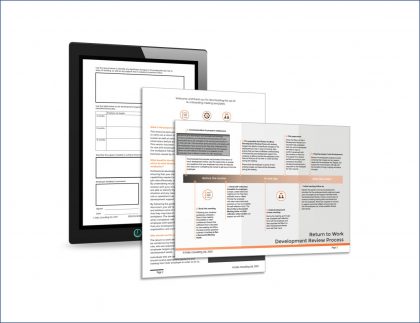The importance of having a structured, relevant, and supportive on-boarding process for employees is well understood, with research demonstrating the direct impact that onboarding has on employee retention.
The same could be said for re-onboarding individuals that have been out of the workplace for a significant amount of time (due to long term illness, parental leave, furlough, sabbaticals, or secondments, for example.) Dedicating time and support to bringing these individuals back into the workplace is critical for employee commitment and productivity.
Very often, the focus of re-onboarding is on procedure and paperwork. Whilst this is, of course, an essential part of the process, you should also use this time to carry out a skills review with that employee.
Why?
Recognising new skills
In many cases the employee may come back to the workplace with a new set of skills that they have learned. This is especially the case if they have been seconded to a different part of the business or to another organisation. They may also have undertaken training during this period or developed various transferable or soft skills. This is a great opportunity to identify these skills and understand how they can be used by the employee to benefit both them and the business.
Identifying skills fade
You may also find that there has been some skills fade, which occurs naturally if certain skills are not being used regularly, and the employee might need some support to get back to where they should be. Carrying out a return to work development review will explore those skills gaps and provide you with a mechanism for identifying and planning development activities to support that employee.
Upskilling for changes in the job role
The role that the employee is returning to may look very different to how it did when they last performed it. Identifying these changes and any support that the employee needs to be able to be effective in their “new-look” role is vital.
CARRYING OUT AN EFFECTIVE SKILLS REVIEW
For a return to work skills review to be really effective, you should…
- make sure that the discussion is supportive and developmental – this is not an interview process and the employee should not feel they are being assessed. This is an opportunity for you to fully understand the skills that the employee has to offer the business, as well as any development needs that you can support them with over the coming months and year.
- encourage the employee to reflect on their own development over this time. Identifying learning is not always as easy as listing courses that have been attended. The employee will need to think about situations that they have been in, and activities that they have completed, during this time and how these have helped them to develop.
- use this as an opportunity for professional development planning: If you already carry out professional development reviews within your organisation then bring this into the re-onboarding process. Make sure that the employee receives actionable targets and ongoing support following the meeting.
At a time when organisations are having to facilitate the return of a large number of employees, it can be easy to just focus on the procedural requirement of returning to the workplace, but making sure that you include a skills review in this process will have longer term benefits for your business and will help you to focus on the needs of the individual as they are welcomed back.

Would you like to carry out a return to work review with your employees?
Access the Return to Work Development Review Template
Return to Work Review